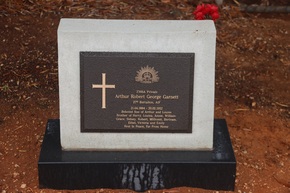
7475
GARNETT, Arthur Robert George
| Service Number: | 2366 |
|---|---|
| Enlisted: | 21 June 1915 |
| Last Rank: | Private |
| Last Unit: | 27th Infantry Battalion |
| Born: | London, England, 21 April 1884 |
| Home Town: | Not yet discovered |
| Schooling: | Not yet discovered |
| Occupation: | Printer |
| Died: | Hypostatic Pneumonia , Renmark Soldiers Memorial Hospital, South Australia , 20 February 1952, aged 67 years |
| Cemetery: |
Renmark Cemetery, S.A. Section L, Plot 5 |
| Memorials: |
World War 1 Service
| 21 Jun 1915: | Enlisted AIF WW1, 2366, 27th Infantry Battalion | |
|---|---|---|
| 21 Sep 1915: | Involvement Private, 2366, 27th Infantry Battalion, --- :embarkation_roll: roll_number: '15' embarkation_place: Adelaide embarkation_ship: HMAT Star of England embarkation_ship_number: A15 public_note: '' | |
| 21 Sep 1915: | Embarked Private, 2366, 27th Infantry Battalion, HMAT Star of England, Adelaide | |
| 23 Jul 1917: | Discharged AIF WW1, 2366, 27th Infantry Battalion |
Help us honour Arthur Robert George Garnett's service by contributing information, stories, and images so that they can be preserved for future generations.
Add my storyBiography contributed by Paul Lemar
Arthur was born in England on 21.04.1884 to Arthur (1857-1933) and Louisa Elizabeth (1860-1933) GARNETT nee CLOSIER.
Arthur GARNETT senior had been previously married to Mary Jane GREEN (1857-1881) and they had one son.
Arthur then gained 10 more siblings.
Arthur came to Australia in about 1912. He did not marry.
In the Renmark electoral rolls in 1943, he gave his occupation as a woodcutter and his address as Millewa via Renmark.
Arthur GARNETT died at the Renmark Hospital on 20 February 1952 aged 68.
Military
Arthur joined the AIF on 21.06.1915 and was allocated service number 2366A. He was attached to the 27th Battalion.
He embarked for Egypt where he contracted influenza and was hospitalised on the island of Mudros around the time of the evacuation from Gallipoli.
He arrived in France in March 1916 and served with his battalion however ongoing illness saw him constantly in hospital and then evacuated to England for treatment for hernia problems.
As a result, he was returned to Australia arriving 05.06.1917 and discharged from the AIF on 23.07.1917.
He was granted a military invalid pension of 15 shillings per fortnight from 24.07.1917.









